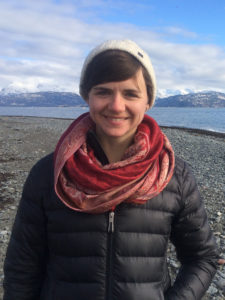Graduate Profile: Vivian Underhill, Doctoral Candidate in Feminist Studies
 Vivian Underhill is a fourth-year PhD Candidate in the Feminist Studies program at UC Santa Cruz. Her work is at the intersections of feminist and critical race science studies, queer ecology, and hydrology in California. Her writing has been published in Foglifter, Utterance, Bitch Magazine, The Colorado Daily, and New West.
Vivian Underhill is a fourth-year PhD Candidate in the Feminist Studies program at UC Santa Cruz. Her work is at the intersections of feminist and critical race science studies, queer ecology, and hydrology in California. Her writing has been published in Foglifter, Utterance, Bitch Magazine, The Colorado Daily, and New West.
Vivian was a member of our inaugural cohort of Public Fellows, in 2016 – 2017. That role placed her at the Northern Alaska Environmental Center, where she worked on a grassroots campaign for environmental justice and just energy transition in Northern Alaska.
Most recently, Vivian was a 2018 – 2019 UC Santa Cruz SSRC-DPD fellow. This quarter THI caught up with her to learn about her work on California’s groundwater system and its situatedness within processes of U.S. imperialism and racial capitalism, how she used the SSRC-DPD grant, and how her research is progressing.
You research fracking and ground water in the San Joaquin Valley. Can you tell us more about that—what are your academic, intellectual, and artistic interests, main through lines, or concerns?
In thinking about groundwater and oil in the San Joaquin Valley, I am specifically interested in basing my research questions in the history of California’s water infrastructure projects. These canals, aqueducts, and reservoirs were central to the creation and settlement of ‘productive’ land within U.S. imperialism, and shaped the San Joaquin Valley specifically as a site of both extreme wealth and poverty. Methodologically, I focus on the contemporary production of knowledge and doubt around oil and groundwater, in order to ask what these dynamics can tell us about the production of racialized landscapes of disposability and value. Overall, I am interested in how an attention to the epistemological violences of colonialism might deepen or unsettle the assumptions within contemporary hydrology, and environmental science more broadly—and potentially shift how they are wielded in monitoring and regulating resource extraction.
How did you use the support of the SSRC-DPD grant in 2018?
I used the grant to begin my field work in the San Joaquin Valley. I interviewed a range of people, visited museums and oil fields, and began archival research at the Huntington and Bancroft libraries. I also began a project of driving along California’s aqueduct system, from LA north to Bakersfield, as an embodied way of attending to the agricultural, oil and gas, prison-industrial, and military landscapes that California’s water infrastructure connects and makes possible.
Do you think the direction of your dissertation research has changed over the last year?
I don’t know that the direction itself has changed, but I am definitely more oriented toward archival work than I had been before the DPD research. Before the summer, we had a seminar on archival methods, and I think that training made me much more effective in archival research than I would have been otherwise. As a result, I’m thinking about incorporating archival sources and methods much more integrally than I had been previously.
You’re now a fourth-year PhD student at UC Santa Cruz. Can you tell us about your research this year? Where are you and what are you pursuing?
I am in Santa Cruz, but spending a lot of time in the San Joaquin Valley. I am using this year to do as much field and archival research as I can, hoping to begin writing in the coming year. I’m also spending writing up what I have learned so far.
